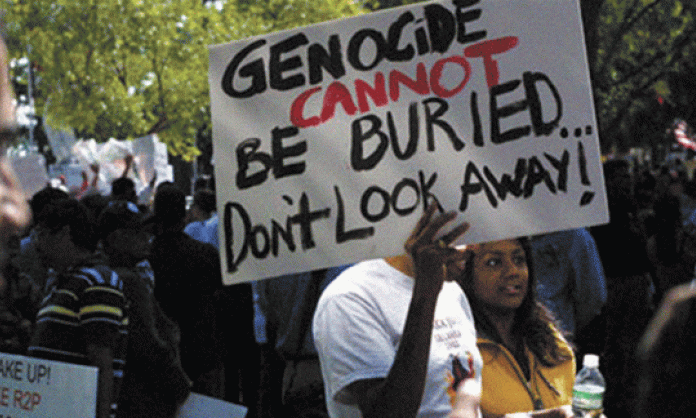For Tamils around the world, 18 May is a day of mourning and remembrance. This year marked the fifth anniversary of the genocide of Sri Lankan Tamils during the final months of the island’s civil war.
More than 70,000 Tamils were murdered by the majority Sinhalese government; at least 100,000 more are unaccounted for.
Most were killed in the deliberate and intensive shelling of areas designated as “no-fire zones”. The Sri Lankan government also restricted the supply of food and medicine, which resulted in large numbers of Tamils dying from starvation and blood loss from injuries.
The sheer horror of the situation prompted the UN in 2009 to appoint a panel to investigate the massacre. It found that the killings and other abuses amount to war crimes and crimes against humanity. Independent experts, such as the People’s Tribunal, have found that these crimes constitute an act of genocide.
During Remembrance Day proceedings in Sri Lanka this year, police desecrated a memorial event in front of the Northern Provincial Council Secretariat at Kaithadi village in Tamil Eelam. Officers stomped on memorial lamps and flowers.
In Australia, Remembrance Day proceedings were held at Springvale Town Hall in Melbourne. There was a minute’s silence for those that gave their lives for the Tamil cause, as well as songs, dance and speeches, which not only commemorated the dead, but expressed the determination of Tamil people around the world to continue the fight for justice.
One of the speakers included Manicka Vasagar, Minister of International Affairs in the Transnational Government of Tamil Eelam.
“I’m standing in front of you today as a terrorist. The government of Sri Lanka has proscribed whole Tamil groups – 16 of them internationally – as terrorist groups and I’m one of the 424 Tamil activists that have been listed as a threat to the government of Sri Lanka”, he said.
In Britain, the “Say No to Sri Lanka” conference took place in London and included Trevor Grant, convener of the Tamil Refugee Council of Australia, Palestinian Boycott Israel member Omar Barghouti, and two members of the African National Congress.
The boycott is inspired by the boycott of apartheid South Africa, as well as some of the more recent successes of the boycott Israel campaign. The conference has made the first official call for boycott, divestments and sanctions against Sri Lanka.
“The biggest threat to the government of Sri Lanka is the united Tamil Diaspora. We can bankrupt Sri Lanka, economically, politically, socially; boycott everything Sri Lankan, don’t buy anything Sri Lankan ... and discourage tourism. Tell Australia and the world the truth and expose Sri Lanka in whatever way we can”, said Manicka.
Earlier this year, the United Nations passed a resolution calling for an international inquiry into war crimes committed in Sri Lanka during the 26-year civil war. The Australia government shamefully refused to support the resolution. It fully supports the Sri Lankan government and its genocidal policies.
While an independent inquiry would be a step forward for Tamil justice, a grassroots movement to boycott Sri Lanka, like the movement against South Africa, will put more pressure on the Sri Lankan government than any UN resolution – just as the boycott campaign has done more to highlight the terrorist state of Israel than the numerous UN resolutions Israel violates.
Speaking with Red Flag after proceedings, Vasagar expressed his disappointment with the Australian government’s response to the resolution: “People need to know the truth about how and why these people were killed and the whereabouts of the 146,000 people who are still classified as unaccounted for.
“There are prisoners – and nobody knows who they are or how many there are. There are still 50,000 internally displaced people refused entry into their own home and lands. There are 17 of the 19 army battalions in the Tamil areas.
“So they’re subjugating the Tamils; they’re terrorising the people and even after five years people are leaving by boats as refugees. In fact last week two boats arrived in India. So that means that the country is under siege by the military. Rape, murder, torture by the army is going on and the Australian government’s purpose is to stop the boats. The Australian government does not want to look at the root cause of these refugee boats.”
ASIO has declared 42 Tamils seeking asylum in Australia to be “security threats”. They have been detained for the last four and a half years. While the Australian government treats Tamil refugees as terrorists, a former Australian diplomat Palitha Kohona has been implicated in the “White Flag incident” in which members of the Tamil Tigers were massacred after a negotiated surrender.
“Once again the role of former senior DFAT official Palitha Kohona who is now the Permanent Representative to the UN mission has been called into question ... Foreign Minister Julie Bishop should come clean about Australia’s relationship with current and former Sri Lankan officials who are implicated in war crimes”, said Greens Senator Lee Rhiannon.










